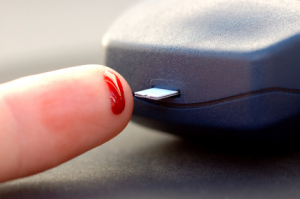by
Barbara Kram, Editor | August 16, 2009

A blood glucose measure
commonly used in hospitals
and by patients is the subject
of an urgent FDA warning
Certain medications may fool commonly used blood sugar test strips and meters into showing high blood sugar levels. Using that false information as a basis for treatment may prove deadly. The FDA has issued a detailed warning about the problem to alert doctors and diabetic patients on certain medications.
Specifically, the FDA has alerted patients and practitioners to the possibility of falsely elevated blood glucose readings when using GDH-PQQ glucose test strips on patients who are receiving therapeutic products containing certain non-glucose sugars. These sugars can falsely elevate glucose results, which may mask low blood sugar or prompt excessive insulin administration, leading to serious injury or death.
The agency has provided details about the problem in a public health notification:




Ad Statistics
Times Displayed: 33220
Times Visited: 889 Stay up to date with the latest training to fix, troubleshoot, and maintain your critical care devices. GE HealthCare offers multiple training formats to empower teams and expand knowledge, saving you time and money
http://www.fda.gov/MedicalDevices/Safety/AlertsandNotices/PublicHealthNotifications/ucm176992.htm
The Web site warns that GDH-PQQ glucose monitoring measures a patient's blood glucose value using methodology that cannot distinguish between glucose and other sugars. Certain non-glucose sugars, including maltose, xylose, and galactose, are found in certain drug and biologic formulations, or can result from the metabolism of a drug or therapeutic product.
When these non-glucose sugars are present in the patient's blood, using a GDH-PQQ glucose test strip will produce an elevated glucose result which may suggest the need for clinical action. This can lead to inappropriate dosing and administration of insulin, potentially resulting in hypoglycemia, coma, or death.
In addition, cases of actual hypoglycemia may go unrecognized if the patient and health care practitioner rely solely on the test result obtained with the GDH-PQQ glucose test strips.
The message to patients is: NEVER use GDH-PQQ* glucose meters or test strips if you are using drug products or therapies that contain certain sugars other than glucose.
Lab Tests, Some Other Methods, Are Okay
Other glucose test strip methodologies are not affected by the presence of non-glucose sugars. The unaffected methods are glucose oxidase, glucose dehydrogenase nicotine adenine dinucleotide (GDH-NAD), or glucose dehydrogenase flavin adenine dinucleotide (GDH-FAD). (Don't worry about lab-based blood tests--they don't use the methodology of concern.)
Note that Bayer Diabetes Care has issued a statement to assure patients that the company's Bayer CONTOUR and Bayer BREEZE2 Blood Glucose Monitoring Systems do NOT use the problematic GDH-PQQ technology.
*glucose dehydrogenase pyrroloquinoline quinine
Again, be sure to read the details and recommendations, including a list of technologies of concern:
http://www.fda.gov/MedicalDevices/Safety/AlertsandNotices/PublicHealthNotifications/ucm176992.htm
A separate page is prepared for patients:
http://www.fda.gov/MedicalDevices/Safety/AlertsandNotices/PatientAlerts/ucm177189.htm

